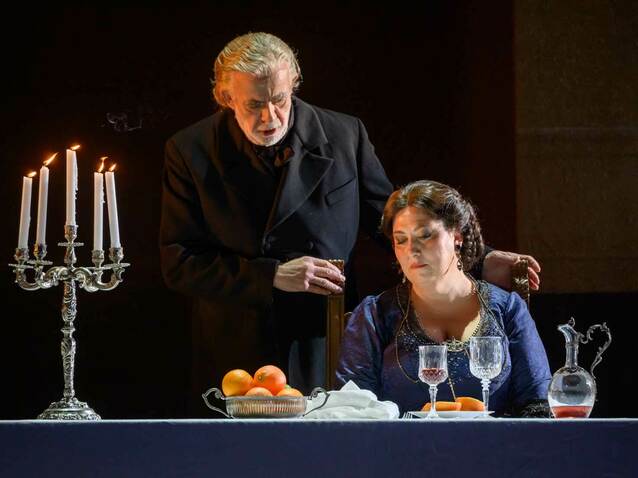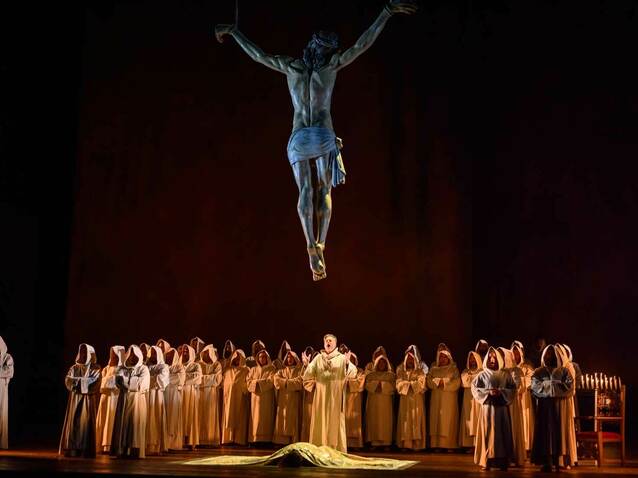 © A. Bofill / Liceu
© A. Bofill / Liceu
Anna Pirozzi's inexhaustible forza and accuracy, stylistic appropriateness and the beauty of her singing were the main reasons for the success of the premiere of La Forza del destino at Liceu. Nicola Luisotti's great musical direction and the magnificent singing of Brian Jagde and Artur Ruciński were also very important, but it was the Neapolitan soprano's performance that brought the audience to its feet at the end.
With three highly demanding arias, a duet with the tenor and the exhausting duet with the bass, the character of Leonora di Vargas is a real vocal marathon that few sopranos today can face without fainting. Anna Pirozzi, very cleverly, warmed up her voice without taking any risks in the first scene, gained strength with each new intervention and crowned her performance with a memorable ‘Pace, pace mio dio’ containing everything that makes it one of Verdi's most celebrated soprano arias.
Polish baritone Artur Ruciński, who already successfully paired with Pirozzi in last February's Ballo in maschera, brought another gruelling vocal marathon to the character of Don Carlo di Vargas, Leonora's intractable brother. Ruciński does not possess a spectacular voice either in projection or beauty, but he is a confident, highly intelligent singer, who does not fail, does not disappoint and always manages and makes his important vocal resources shine one hundred percent at decisive moments. ‘Urna fatale‘ and ‘Solenne in quest’ora’ are two such decisive moments, and Ruciński knew how to take advantage of them.
American tenor Brian Jagde, who last February sang La forza at New York’s Metropolitan, has improved greatly since we heard him at Liceu in 2019 singing La Gioconda. His voice, while maintaining power, projection and brilliance in the treble, has become more refined and has acquired expressive nuances. His Don Álvaro was solid, convincing and important.

La forza del destino - Gran Teatre del Liceu (2024) (c) A. Bofill / Liceu
John Relyea was majestic in the role of Padre Guardiano with his imposing bass voice allowing him to deliver dark but perfectly timbral lower notes. Pietro Spagnoli made a successful return to Liceu in the role of Fra Melitone, the only realistic and credible character in the whole opera, already heralding Falstaff's lucid scepticism. Caterina Piva passed with sufficiency but without leaving a mark on the memory for the anecdotal character of Preziosilla. The chorus was good, better the male than the mixed chorus, in this work which is also of notable choral demand.
Nicola Luisotti, a conductor with a very long operatic career who had never, however, performed at Liceu, was in charge of organising all this and bringing it to a successful conclusion. His conducting was very thorough and careful in style, he respected the solo voices, resolved the concertantes well, gave confidence to the chorus and balanced the orchestral sections wisely. The audience, something rare in a voice-worshipping theatre like Liceu, applauded his work warmly.

La forza del destino - Gran Teatre del Liceu (2024) (c) A. Bofill / Liceu
This Forza, scenically, was an ‘old warehouse remains’ offered in Liceu's old co-production with the Opéra de Paris which premiered in the French capital in 2011 and could be seen at the Liceu in 2012. Scenically directed by Jean-Claude Auvray, the production, which was already dull and bland twelve years ago, has not improved.
Theatrically making a good Forza is not easy. The play, an important Verdi that has aged badly, presents us with a powerful fatalistic melodrama with well-drawn characters and intense dramatic situations. Unfortunately, it rests on a dusty plot: a clichéd story of honour, dandruff and massacre of the where even the prompter dies. The men of the Vargas family, obsessed with honour, purity of blood and the virginity of the family women, seem to be taken from a far-right party rally.
The production is sober and austere in both material and conceptual aspects, and its best feature is that it does not attempt to reinterpret the play. It limits itself to insisting on the theatrically strong points, on the relationship between characters and the strength of the dramatic conflicts. Meanwhile, it attempts to tiptoe around the context (relocated from the War of the Austrian Succession to the Italian Risorgimento without any apparent benefit) as well as the scenes of ‘local colour’ and the crude plot twists which nowadays seem almost cartoonish and comical. Thus, the scenes between two or three central characters worked well, and the mass scenes and large frescoes of soldiers, beggars and ‘the common people enjoying themselves’ were theatrical wrecks. The sole exception was the friars' choir, a still, static scene which, aptly lit by Laurent Castaingt, looked like a painting by Zurbarán.
Xavier Pujol
Barcelona, 9th Novembrer 2024
La forza del destino | 09 November - 19 November 2024 | Gran Teatre del Liceu
La forza del destino by Giuseppe Verdi. Giacomo Prestia, bass. Anna Pirozzi, soprano. ArturRuciński, baritone. Brian Jagde, tenor. Caterina Piva, mezzosoprano. John Relyea, bass. Pietro Spagnoli, baritone. Orchestra and Choir of Gran Teatre del Liceu. Conductor, Nicola Luisotti. Stage director, Jean-Claude Auvray. Restaging, Leo Castaldi. Scenography, Alain Chambon. Costumes, Maria Chiara Donato. Lighting, Laurent Castaingt. Production by Gran Teatre del Liceu and Opéra National de Paris.
the 11 of November, 2024 | Print
Comments